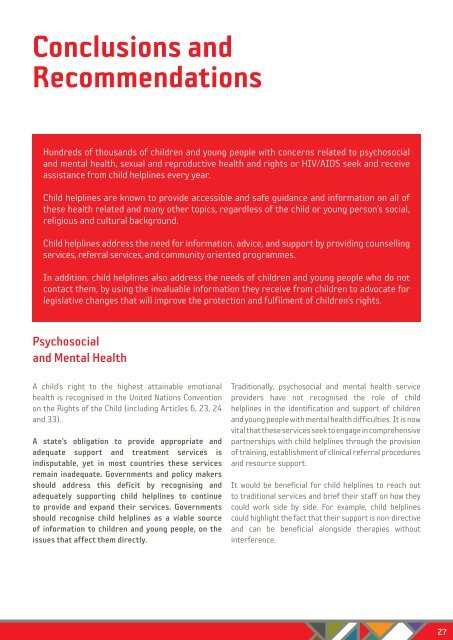The Voices of Children and Young People
FjLR300hYsM
FjLR300hYsM
Create successful ePaper yourself
Turn your PDF publications into a flip-book with our unique Google optimized e-Paper software.
Conclusions <strong>and</strong><br />
Recommendations<br />
Hundreds <strong>of</strong> thous<strong>and</strong>s <strong>of</strong> children <strong>and</strong> young people with concerns related to psychosocial<br />
<strong>and</strong> mental health, sexual <strong>and</strong> reproductive health <strong>and</strong> rights or HIV/AIDS seek <strong>and</strong> receive<br />
assistance from child helplines every year.<br />
Child helplines are known to provide accessible <strong>and</strong> safe guidance <strong>and</strong> information on all <strong>of</strong><br />
these health related <strong>and</strong> many other topics, regardless <strong>of</strong> the child or young person’s social,<br />
religious <strong>and</strong> cultural background.<br />
Child helplines address the need for information, advice, <strong>and</strong> support by providing counselling<br />
services, referral services, <strong>and</strong> community oriented programmes.<br />
In addition, child helplines also address the needs <strong>of</strong> children <strong>and</strong> young people who do not<br />
contact them, by using the invaluable information they receive from children to advocate for<br />
legislative changes that will improve the protection <strong>and</strong> fulfilment <strong>of</strong> children’s rights.<br />
Psychosocial<br />
<strong>and</strong> Mental Health<br />
A child’s right to the highest attainable emotional<br />
health is recognised in the United Nations Convention<br />
on the Rights <strong>of</strong> the Child (including Articles 6, 23, 24<br />
<strong>and</strong> 33).<br />
A state’s obligation to provide appropriate <strong>and</strong><br />
adequate support <strong>and</strong> treatment services is<br />
indisputable, yet in most countries these services<br />
remain inadequate. Governments <strong>and</strong> policy makers<br />
should address this deficit by recognising <strong>and</strong><br />
adequately supporting child helplines to continue<br />
to provide <strong>and</strong> exp<strong>and</strong> their services. Governments<br />
should recognise child helplines as a viable source<br />
<strong>of</strong> information to children <strong>and</strong> young people, on the<br />
issues that affect them directly.<br />
Traditionally, psychosocial <strong>and</strong> mental health service<br />
providers have not recognised the role <strong>of</strong> child<br />
helplines in the identification <strong>and</strong> support <strong>of</strong> children<br />
<strong>and</strong> young people with mental health difficulties. It is now<br />
vital that these services seek to engage in comprehensive<br />
partnerships with child helplines through the provision<br />
<strong>of</strong> training, establishment <strong>of</strong> clinical referral procedures<br />
<strong>and</strong> resource support.<br />
It would be beneficial for child helplines to reach out<br />
to traditional services <strong>and</strong> brief their staff on how they<br />
could work side by side. For example, child helplines<br />
could highlight the fact that their support is non-directive<br />
<strong>and</strong> can be beneficial alongside therapies without<br />
interference.<br />
27


